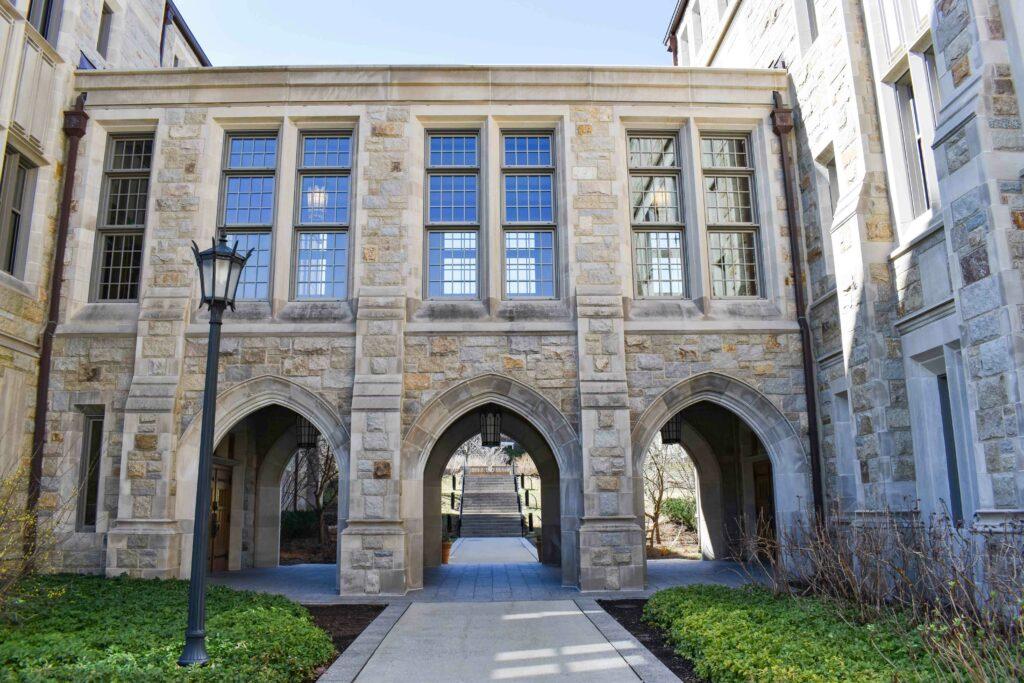The law adds to existing federal requirements of Title IX, with main features including a mandated sexual misconduct climate survey, requirements for courses and training programs, memorandums of understanding with local police, and a confidential resource provider on every college campus.
Under the new law, colleges and universities in Massachusetts will be required to give students a survey every four years that measures areas related to sexual misconduct on campus. The survey is designed to gauge factors including the number of reported and unreported incidents on campus and perceptions about campus safety. A task force, composed of both state officials, appointees, and university officials, will create model questions, and universities can choose whether to use these questions or construct their own surveys that meet state requirements.
Melinda Stoops, Boston College’s deputy Title IX coordinator for students and associate vice president for student health and wellness, said that distribution of the survey will be a new requirement for BC’s administration.
“In terms of that survey, they actually provide several years for institutions to be able to identify a survey and administer the first one, so this isn’t something that would have to be done right away, but it is something that we will have to start thinking about and thinking about how to approach it, and whether or not to use a survey that’s out there or make one of our own,” Stoops said.
There is some overlap between BC’s existing policy and the new state requirements, Stoops said. For example, BC posts its sexual misconduct policy and the resources it offers on its website. Other facets of the new law, including an amnesty requirement for those who report sexual violence, are similar to existing BC code.
Stoops said that BC encourages individuals to report sexual violence, and that the approach the University will take in investigating reports under the new law will not largely differ from its current policy.
“Our focus when we get a report is on taking care of the student, it’s not to zoom in and see if there was an alcohol violation, or something else along those lines,” Stoops said. “I feel like we already really take care to look at this as the needs of someone impacted by sexual violence coming forward. So in some ways, it’s not all that different from what we’re doing now.”
The law’s requirements for sexual misconduct prevention courses will also affect BC, according to Stoops. Within 45 days of their matriculation, all students will need to complete a training on sexual misconduct prevention and response. BC already requires similar coursework for each freshman class through the platform EverFi, and in order to comply with the new law, BC can adjust its existing modules, Stoops said.
Another significant feature of the law is the confidential resource provider provision, which requires schools to designate one person on campus to this position. The confidential resource provider will provide students with information on reporting options, counseling services, medical and health services, and legal options. This person must be trained in awareness and prevention of sexual misconduct and in trauma-informed response, according to the law.
“The main impact is that we will have to designate at least one person as a confidential resource provider,” Stoops said. “Right now, we have confidential resources but we don’t have one person that’s sort of the go-to person for that. That wouldn’t preclude people from going to other confidential supports, but we would really have one person designated in that role, so I think for us it’s really just identifying who would be the best person to be in that role.”
Most of the work for BC’s administration will be closely evaluating the law’s requirements to determine what aligns with existing policy and what needs to be implemented or changed, Stoops said. As many of the provisions of the law do not need to be immediately enacted, Stoops said BC will create a timeline to plan when it will roll out these changes.
One downside of the new legislation, according to Stoops, is not the content of the law itself, but the timing of when the law was passed, as BC recently finished revamping its policies to comply with the change in Title IX legislation this past year.
“This isn’t a downside in terms of impact but a downside in terms of process,” she said. “… We spent much of the spring and summer making changes to get in line with that … So I think that the downside is just with the timing of it. It’s having to go back and look at things that we just changed.”
Stoops praised the new law for pushing colleges and universities to prioritize sexual violence prevention, and said that its mere passing holds symbolic importance.
“I feel like the existence of this legislation, the fact that it was created and had been talked about for a long time, that it passed and the governor signed it right away, it does send a message about the importance of this issue, and I think that in and of itself is something that’s noteworthy,” Stoops said.
Featured Image by Maddy Romance / Heights Editor







